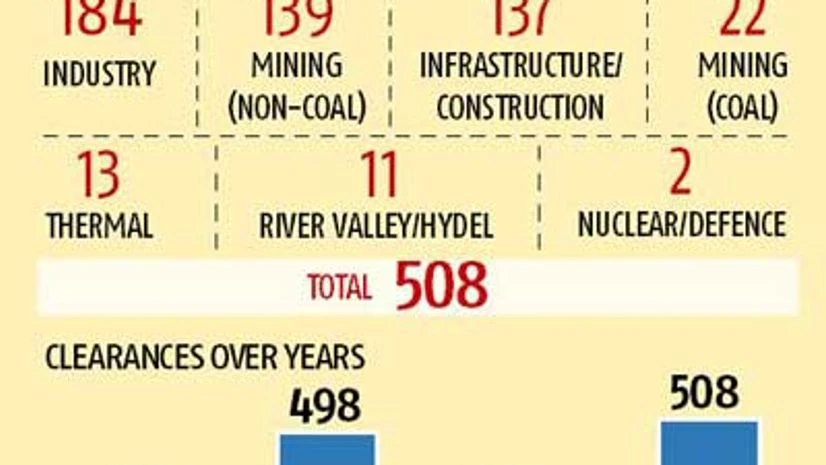A lot of water has flown down the Ganga since the days of 'Jayanti Tax'.
Once the favourite punching bag for corporate India for inordinate delays in clearances and its opaque nature of functioning, the Union Ministry of Environment, Forest and Climate Change has reinvented itself through a combination of transparent processes and a more stringent enforcement machinery.
"The ministry was regarded as 'road-block' ministry where files used to stop. The average time for project approval with proper conditions was 600 days earlier; now it's down to 190 days and I shall make it 100 days," Environment, Forest and Climate Change Minister Prakash Javadekar told Business Standard in a recent interview.
Significant progress has been made in control of industrial pollution by tightening emission standards and enforcement. The ministry has identified around 3,400 polluting industrial units and mandated installations of 24x7 air- and effluent-monitoring systems. Of these, more than 2,400 units have already installed these systems.
"If pollution norms for any parameter are exceeded continuously for more than 15 minutes, SMS alert is generated and sent to all concerned individuals and regulatory agencies. 650 industries have been closed down based on these inputs," the ministry said in an e-book released to mark the second anniversary of the Prime Minister Narendra Modi-led government.
The ministry has reviewed the methodology to compute a Comprehensive Environment Pollution Index (CEPI) score and re-categorised industries into red, orange, green and white.
Least polluting industries which fall in the white category are allowed self certification. The new method to compute CEPI score is expected to bring relief to less polluting industries, while acting as an advance signal for borderline cases.
The comprehensive revamp of waste management rules was undertaken keeping in mind the prime minister's pet project of Swachh Bharat Mission. The new rules would help recover resources through recycling, which could possibly result in income and employment generation.
Another major push for employment would come from the number of projects cleared. The e-book claimed around 2,000 projects were given various clearances, such as environmental, forest and National Board for Wildlife, in the past two years. These clearances unlocked Rs 10 lakh crore of investment with a potential to generate about a million jobs, the e-book claimed. The ministry has branded this as "Ease of Doing Responsible Business," inspired by the Ease of Doing Business rankings of the World Bank, which has become one of the favorite buzz words of the Modi government.
According to the annual report of the ministry for 2015-16, the ministry had given more environmental clearances in the first 10 months than in the entire last year. The ministry cleared 508 Category A projects in key sectors between April 2015 and January 2016. Of these, 184 were from industry, 139 non-coal mining and 137 infrastructure. In comparison, the ministry had cleared 438 projects in 2014-15.
The previous United Progressive Alliance government had cleared 439 and 498 projects in 2012-13 and 2013-14, respectively.
Eyeing an ambitious target of increasing forest cover from the current 21 per cent to 33 per cent of the landmass in the country, Javadekar has started new schemes such as urban forest and school nursery. These will help increase green cover outside the forest areas.
Highlighting the coastal initiatives, Javadekar has reiterated that mangroves have increased by 100 sq km and often talked about the detailed high-resolution coastal map and High Tide Line drawn with high-resolution technology and low-flying survey.
The e-book added the efforts of the ministry has brought down industrial pollution in the Ganga by almost 35 per cent. Some 764 grossly polluting industries (GPIs) were mandated to install online continuous effluent monitoring systems. GPIs were identified as industries discharging effluent into water course and a) handling hazardous substance, or b) effluent having BOD (biochemical oxygen demand) load of 100 kg per day or more, or c) a combination of (a) and (b) Closure directions have been issued to 150 such GPIs for non-installation of monitoring systems.
While the Ganga has got all the attention, the ministry also seems to be concerned about another national icon on the banks of the Yamuna. The ministry had undertaken projects for conservation of the Taj Mahal. The annual report said the Uttar Pradesh government was asked to "submit fresh proposals to seek more funds during the Twelfth Five-Year Plan from the Planning Commission." It added, "However, till date no comprehensive proposal has been received from the government of UP." The Taj Trapezium Zone (TTZ) authority has been extended till end of 2016 to implement protection and improvement programmes in the TTZ, the annual report said.

)
